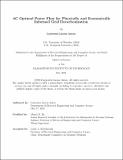| dc.contributor.advisor | Ilic, Marija D. | |
| dc.contributor.author | Anton, Laurentiu Lucian | |
| dc.date.accessioned | 2024-08-14T20:11:59Z | |
| dc.date.available | 2024-08-14T20:11:59Z | |
| dc.date.issued | 2024-05 | |
| dc.date.submitted | 2024-07-10T12:59:26.257Z | |
| dc.identifier.uri | https://hdl.handle.net/1721.1/156160 | |
| dc.description.abstract | Current practices for power systems operations and planning rely on an approximate optimal power f low formulation known as DC Optimal Power Flow (DC OPF). Results from DC OPF are not implementable, requiring feasibility checks and adjustments from AC power flow analysis. Current methodologies do not guarantee convergence, feasibility, or robustness, and they rely heavily on operator knowledge and intervention. This work uses AC Optimal Power Flow (AC OPF) to directly obtain feasible dispatch signals that guide enhanced grid operations and planning within the context of Puerto Rico’s grid decarbonization efforts. A comprehensive application of AC OPF is used to assess the robustness of the Puerto Rican power grid and explore an array of scenarios involving the retirement of existing generating assets and integration of solar PV. A public model was assessed by analysing of several operational equilibria obtained via economic dispatch and loss minimization. Additionally, a Jacobian-based N-1 screening was performed, identifying critical contingencies requiring corrective actions. These insights, as well as considerations from the Puerto Rico 100 Study and PREPA’s 10Year Plan, were used to assess the deployment of potential solar assets at various stages of retirement for the San Juan, Palo Seco and Aguirre assets, in that order. Results provided locational, quantitative, and timely insights into optimal deployment strategies that align with Puerto Rico’s decarbonization goals. The findings confirm the ability for Puerto Rico to transition to a high-renewable deployment scenario, and provide guidance on where to strategically incentivize renewable deployment and reactive power support, in what quantities, and in response to which generator retirements. | |
| dc.publisher | Massachusetts Institute of Technology | |
| dc.rights | In Copyright - Educational Use Permitted | |
| dc.rights | Copyright retained by author(s) | |
| dc.rights.uri | https://rightsstatements.org/page/InC-EDU/1.0/ | |
| dc.title | AC Optimal Power Flow for Physically and Economically Informed Grid Decarbonization | |
| dc.type | Thesis | |
| dc.description.degree | S.M. | |
| dc.contributor.department | Massachusetts Institute of Technology. Department of Electrical Engineering and Computer Science | |
| mit.thesis.degree | Master | |
| thesis.degree.name | Master of Science in Electrical Engineering and Computer Science | |
